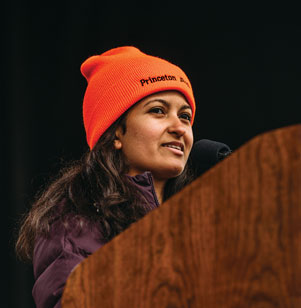Princeton Students Lead National March for Life
By Jon Garaffa, Princeton ’20
On Friday, January 18, students from Princeton University were at the forefront of the March for Life in Washington, D.C., an annual rally aiming to protest peacefully the practice and legality of abortion in the United States. The rally started in 1974 and takes places annually near the anniversary of Roe v. Wade, the decision of the Supreme Court to decriminalize abortion.
This year, students from Princeton Pro-Life led the march, chanting in the front row as they proceeded through the city. Many Princeton students had come to the march in previous years. “It was really different to be able to march in the front and see all the people we were leading,” stated Allie Burton ’17, who served as past vice president of Princeton Pro-Life and made her third trip back to D.C. this year. “Personally, it was a very special moment for me when we marched past the Supreme Court.” Ally Cavazos ’19, the president emerita of Princeton Pro-Life, gave a speech to the crowd to fit the pro-science theme of the March for 2019: “Unique from Day One.”

Princeton Pro-Life President Ally Cavazos ’19 spoke to the March for Life crowd, telling her personal story in support of how abortion can never be considered an “act of generosity” towards the unborn.
“I didn’t realize I was going to be a personal influence in the lives of other young adults, and it’s really cool to know that I have been, even if it’s just in a small way,” declared Cavazos, who was encouraged to see such a positive response to her speech. “I also grew in my own acceptance of my physical self, because during my speech, I talked about my genetic bone disease, osteogenesis imperfecta. That was the first time I’d spoken publicly about it, and it took courage…”
In her speech, Cavazos opened up about her struggle with the condition and used her experience to support a biological case for life’s start at conception. Her conviction, shared by those at the march, is that an abortion can never be considered an “act of generosity” towards the unborn, even if great hardships may occur in their future.
Princeton Pro-Life takes a unique approach to activism on campus, often appealing to students’ reason. “Princeton Pro-Life has an academic and apologetic focus,” stated Cavazos. “We bring in a lot of speakers to engage with the Princeton community intellectually. Students and [other] people on our campus appreciate our approach.”
Students participated in faith-related events over the course of their time in Washington, DC. Services relating to the march included Catholic Masses at the Verizon Center and at the Basilica of the National Shrine of the Immaculate Conception. The march’s schedule also started off with a musical introduction by Christian band Sidewalk Prophets. “Much of the pro-life movement is guided by devout Christians who very much see this as living out God’s vision for how we are to take care of others and ourselves,” explained Cavazos.
Advocating for the sanctity of human life from conception to natural death is an increasingly important part of many young people’s faith, especially in a culture that celebrates the contrary. “I was in Sunday school classes when I learned about [abortion] for the first time. I was appalled at the thought that we were intentionally killing the most innocent and vulnerable among us: the unborn,” stated Cavazos. “That’s when I realized that this was important to me.”



